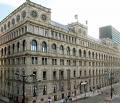The Blackley Family and Homeopathy
November 21, 2008
 Charles Harrison Blackley and John
Galley Blackley, father and
son,
were influential homeopaths who were colleagues of William
Bayes,
George Henry
Burford,
David Dyce
Brown,
John Henry
Clarke, Paul
Francois
Curie,
Robert Ellis
Dudgeon, John
Epps,
Washington
Epps,
James Johnstone,
Richard
Hughes,
Thomas Robinson
Leadam,
John Moorhead Byres
Moir,
Alfred Crosby
Pope,
Mathias
Roth,
C T Knox
Shaw,
Charles Edwin
Wheeler,
David Wilson, James
Craven Wood, Stephen
Yeldham
and many others.
Charles Harrison Blackley and John
Galley Blackley, father and
son,
were influential homeopaths who were colleagues of William
Bayes,
George Henry
Burford,
David Dyce
Brown,
John Henry
Clarke, Paul
Francois
Curie,
Robert Ellis
Dudgeon, John
Epps,
Washington
Epps,
James Johnstone,
Richard
Hughes,
Thomas Robinson
Leadam,
John Moorhead Byres
Moir,
Alfred Crosby
Pope,
Mathias
Roth,
C T Knox
Shaw,
Charles Edwin
Wheeler,
David Wilson, James
Craven Wood, Stephen
Yeldham
and many others.
 Charles Harrison Blackley **1820 -
1900 **MD
Brussels
1874,
MRCS
Eng.
1858
often referred to as a
’Scottish’
allopathic physician, was actually born in Bolton and raised in
Manchester. He suffered very badly with asthma and hay
fever.
He was a Physician at the Manchester Homeopathic
Hospital,
Charles Harrison Blackley **1820 -
1900 **MD
Brussels
1874,
MRCS
Eng.
1858
often referred to as a
’Scottish’
allopathic physician, was actually born in Bolton and raised in
Manchester. He suffered very badly with asthma and hay
fever.
He was a Physician at the Manchester Homeopathic
Hospital,
Charles Harrison Blackley was the first person to identify pollens as the cause of hay fever, and the first person to fully describe and study allergens. In 1873, he was so impressed by the infinitesimal quantity of allergens required to cause hay fever, that he became a homeopath (Reto Crameri,* Allergy and Asthma in Modern Society: A Scientific Approach : Dedicated to Kurt Blaser, *(Karger Publishers, 2006). Page 5), and he became a member the British Homeopathic Society, and he was a Medical Officer at the Manchester Homeopathic Hospital and Dispensary.
Charles Harrison Blackley practiced at 3 Albany Road, Southport, and at Arnside House, Old Trafford, Manchester in 1871.
Charles Harrison Blackley attended (Anon, The Homeopathic World, Volume 43, (1908). Page 236) the 2nd International Homeopathic Congress held in London (Anon, The Medical Counselor, Volume 7, (The Michigan State Homeopathic Society, 1883). Page 347) in on 11th-18th July 1881 (Anon, The Homeopathic World, (August 1,1881)) at Aberdeen House, Argyll Street, Regent Street.
From http://www.ncbi.nlm.nih.gov/pmc/articles/PMC1697745/ The chosen model, use of pollen in hay fever, actually comes from the work of a homeopath—Dr Charles Blackley—who, in the 1870s, first identified pollen as the cause of respiratory seasonal allergies…
From https://docs.google.com/viewer?a=v&q=cache:75qBuCDYpUwJ:homeopathyusa.org/uploads/Homeopathy_Efficacy.pdf+&hl=en&gl=uk&pid=bl&srcid=ADGEESi5h102-3-4fTWbzkjedRQS6mj-Y9n4z1PG5oUmRbdHlOpUaxbux9UgZ1zoogdRM8Ck5eeTnZ6EuMLDvlAY4uFelOLpodlpc2xHVouQz1O6eaJ1j1dl598bCmf0FaFv_gRWQCDL&sig=AHIEtbQ0WwbJnuMfOZV62qtIiGC1L-jsoA&pli=1 ’… he actually collected airborne particles using a kite and then counted them. Homeopaths started using dilutions of substances that cause allergies at least 20 years before conventional medicine developed the allergen injections…’
Charles Darwin was very interested in the work of homeopath Charles Harrison Blackley whose work on allergy, Darwin described as ’… ingenious and profoundly interesting…’ (Anon,_ Excerpts from classics in allergy, American Academy of Allergy, (_Ross Laboratories, 1969). Page 12).
Charles Harrison Blackley wrote Notes on the Etiology of Cancer, Hay fever, its causes and treatments, Experimental researches on the nature and causes of catarrhus aestivus, New Observations on Hay fever, with New Experiments on the Quantity of Ozone in the Atmostphere, Hay Fever.
 John Galley Blackley
1850? - 1910? MB London 1869,
MRCS
Manchester
and
Vienna,
was a Physician for Diseases of the
Skin
and the Senior
Physician at the
London Homeopathic
Hospital;
President,
Treasurer
and Honorary
Secretary
of the British Homeopathic
Society.
John Galley Blackley
1850? - 1910? MB London 1869,
MRCS
Manchester
and
Vienna,
was a Physician for Diseases of the
Skin
and the Senior
Physician at the
London Homeopathic
Hospital;
President,
Treasurer
and Honorary
Secretary
of the British Homeopathic
Society.
John Galley Blackley studied in Vienna under Ferdinand Ritter von Hebra and Isidor Neumann.
John Galley Blackley practiced at 29 Devonshire Place, London W.
From _[Some Abiding Themes Hewn from British Homeopathic History](http://www.homeoint.org/morrell/articles/abiding.htm)_ by Peter Morrell. '... In contrast to devotees of high potency, for doctors like ‘… [John James ](/archives/2008/07/29/the-drysdale-family-and-homeopathy/)_[Drysdale](/archives/2008/07/29/the-drysdale-family-and-homeopathy/)… low dilutions did best and he found no advantage above the 3rd decimal…’ _(Frank Bodman, _Richard Hughes Memorial Lecture_, _British Homeopathic Journal 59,_ (1970). Page184). [Thus the 3x became the officially approved and standard tool of UK homeopathic practice from 1830 to 1900](http://www.homeoint.org/morrell/articles/abiding.htm). The early UK homeopaths therefore comprised ‘… _a remarkably able cohort of 3x men – [Stephen Yeldham](/archives/2008/10/01/stephen-yeldham-1810-1896/), John Galley Blackley, [John Moorhead Byres Moir](/archives/2008/12/06/john-moorhead-byres-moir-1853-1928/), [Washington Epps](/archives/2008/07/30/the-epps-family-and-homeopathy/), [C T Knox Shaw](/archives/2009/03/27/c-t-knox-shaw-1865-1923/), etc…’ _to which we can also add the names of ‘… [John Epps](/archives/2008/07/30/the-epps-family-and-homeopathy/)_, [Paul Francois Curie](/archives/2008/07/26/paul-francois-curie-and-homeopathy/), [David Wilson](../archives/2008/10/04/david-wilson-1811-1889/) as well as [Alfred Crosby Pope](/archives/2009/03/29/alfred-crosby-pope-1830-1908/), [Richard Hughes](/archives/2008/07/04/richard-hughes-and-homeopathy/), [David Dyce Brown](/archives/2008/12/14/david-dyce-brown-1840-1910/),… [William Bayes](/archives/2008/08/05/william-bayes-and-homeopathy/), [Thomas Robinson Leadam](/archives/2008/10/04/thomas-robinson-leadam-1809-1881/) and [Robert Ellis Dudgeon](/archives/2009/05/18/archives/2009/08/29/robert-ellis-dudgeon-1820-1904/)_…’' (A Taylor Smith, _letter re Dr Borland’s Obituary_, _British Homeopathic Journal 50.2_, (July 1961). Page 119 and page 123).
John Galley Blackley was present at the British Congress of Homeopathy in 1878, the World’s Congress of Homeopathic Physicians and Surgeons in 1893, and he was present at the International Homeopathic Congress in 1896.
John Galley Blackley attended (Anon, The Homeopathic World, Volume 43, (1908). Page 236) the 2nd International Homeopathic Congress held in London (Anon, The Medical Counselor, Volume 7, (The Michigan State Homeopathic Society, 1883). Page 347) in on 11th-18th July 1881 (Anon, The Homeopathic World, (August 1,1881)) at Aberdeen House, Argyll Street, Regent Street.
John Galley Blackley wrote about Apomorphine, and he submitted cases on typhoid fever and tabes mesenterica with constipation to The Monthly Homeopathic Review in 1883, and cases on diphtheria and Reynaud’s Disease to The Hahnemannian Monthly in 1889, and cases on skin disease to _The Monthly Homeopathic Review_ in 1884, and cases to The Journal of Surgery, Gynecology and Obstetrics in 1907, and many other publications.